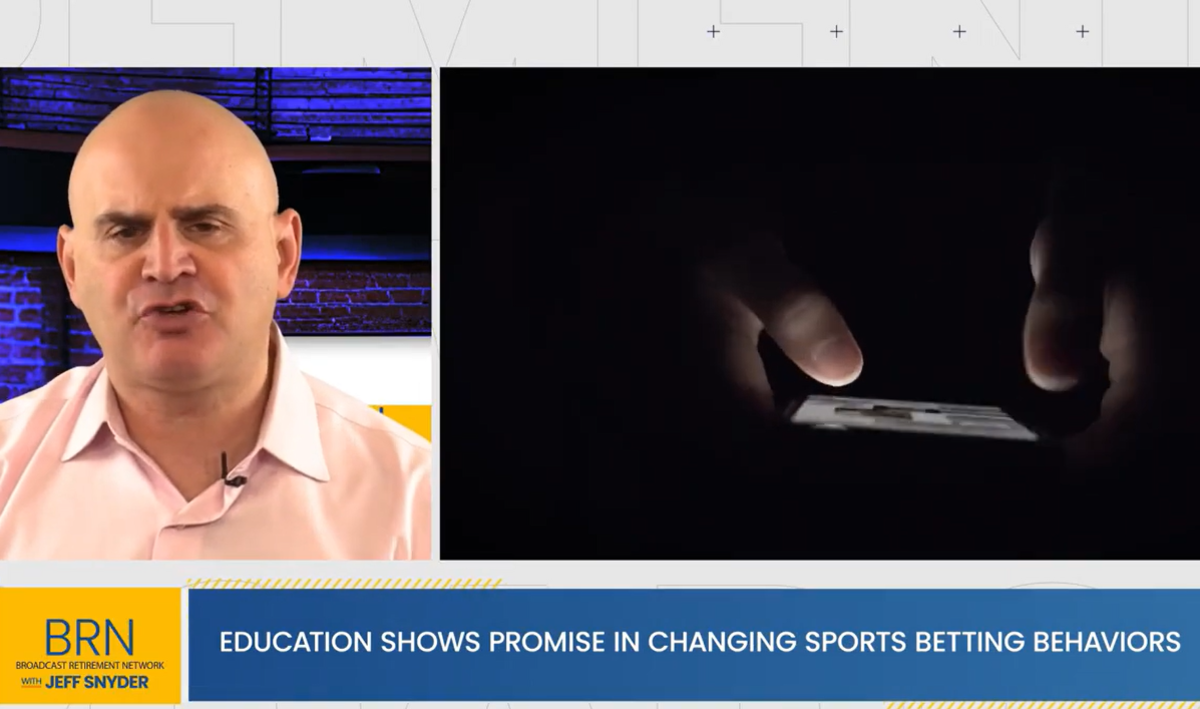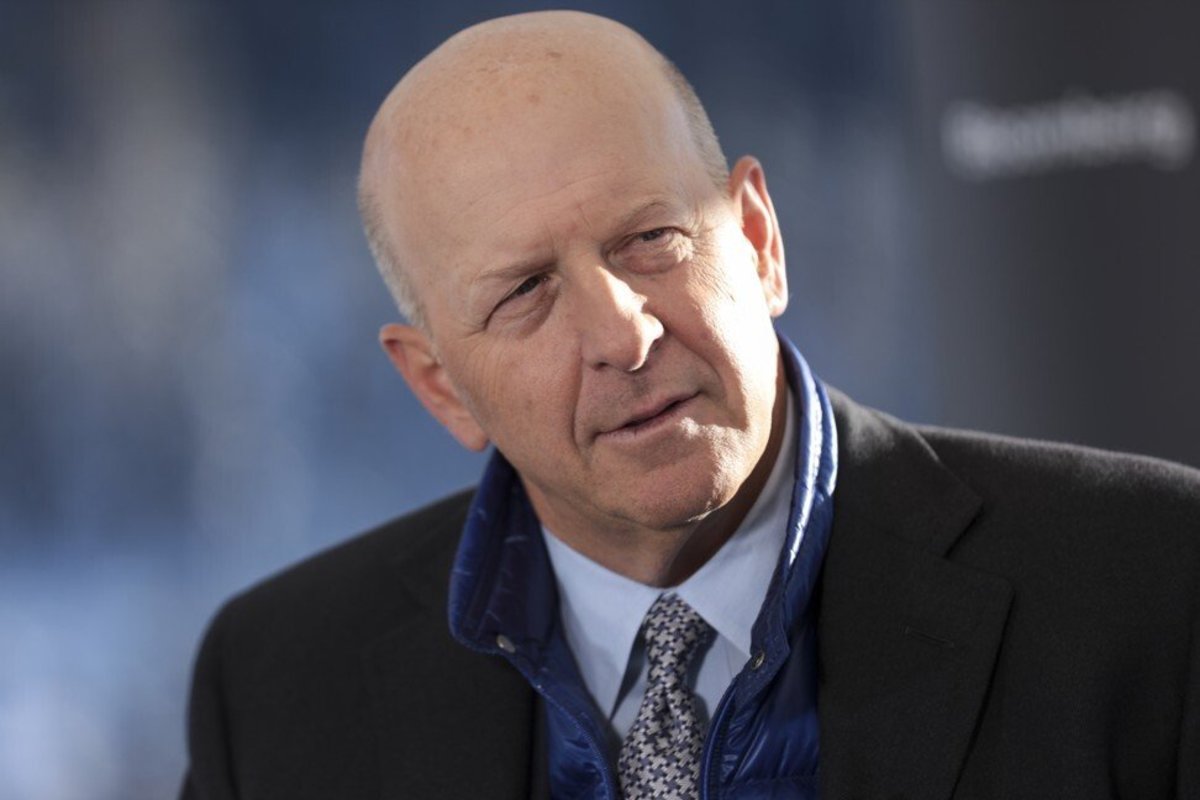Education Shows Promise in Changing Sports Betting Behaviors
The increase in sports betting opportunities in the U.S. correlates with the increases noted in NCAA athletes being asked for inside information.

Sports betting is currently legal in 38 U.S. states and the District of Columbia , with states raking in $9.3 billion in tax revenue since the Supreme Court ruled in 2018 that states could legalize sports betting. Most young people are exposed to gambling while they're in high school, and by the time they graduate college, some develop an unhealthy relationship with betting. Broadcast Retirement Network's Jeffrey Snyder discusses how the NCAA is managing student athlete education with McGill University's Jeffrey L. Derevensky, PhD.
JEFFREY H SNYDER, BROADCAST RETIREMENT NETWORK
(0:03) This morning on BRN, education shows promise in changing sports betting behaviors. (0:11) Joining me now to discuss this is Dr. Jeffrey Derevensky of McGill University's International Center for Youth Gambling Problems and High-Risk Behaviors. (0:25) Dr. Derevensky, great to see you. (0:27) Thanks for joining us on the program this morning.
Jeffrey L. Derevensky, Ph.D., McGill University
(0:29) My pleasure to be here.
JEFFREY H SNYDER, BROADCAST RETIREMENT NETWORK
(0:30) Yeah, it almost feels like deja vu. (0:32) I feel like we've done this before, but in all seriousness, Jeff, let's talk about the impact of gambling on younger generations. (0:41) And I want to ask you about the impact on student athletes.
(0:45) How were they impacted by gambling, by the gambling that's going on? (0:49) Because it's all around the country here in the States.
Jeffrey L. Derevensky, Ph.D., McGill University
(0:52) It's all around the country and it's socially acceptable and it's normative behavior. (0:58) And what we're concerned about is the mental health of athletes and their well-being is in addition. (1:05) So we know that as individuals start gambling and they start chasing their losses, trying to get back more money, what we see is that there's a real problem going forward and that they can get into trouble both physically as well as psychologically.
(1:25) We know that financially they become overly engaged in gambling. (1:31) And so what we're trying to do is trying to do more prevention. (1:35) We're trying to educate people at an early age.
(1:38) Some of our educational programs go down to 9 and 10 year olds to try to get them to understand about gambling, not just probabilities, but what the warning signs are when it becomes a problem.
JEFFREY H SNYDER, BROADCAST RETIREMENT NETWORK
(1:53) And, you know, Jeff, as you were talking, I was thinking not only about the college student, but there must be an impact to the college student athlete. (2:02) And I think a lot of our viewers are familiar with the name and likeness deals that exist. (2:07) So there's definitely a focus now on earning money, but there's also a deleterious effect on the student athlete now as it relates to gambling.
Jeffrey L. Derevensky, Ph.D., McGill University
(2:16) Yeah, the NCAA is particularly concerned about the mental health well-being of the students as well as their safety. (2:25) One of the biggest surprising findings that we had in this most recent study, and we've been doing this study for the NCAA now for 20 years, is the number of athletes who were reported being harassed because they didn't perform according to the gambler's wishes. (2:41) They didn't score as many points or other types of activities.
(2:48) We've moved from gambling as a all or nothing activity. (2:54) When you and I were younger, we'd have to wait till the end of the game to determine who won. (3:00) But today you can make bets throughout the game.
(3:03) And we have these prop bets which are betting on individual performance, and that puts a lot of pressure on the athletes.
JEFFREY H SNYDER, BROADCAST RETIREMENT NETWORK
(3:12) So what does that mean for their mental health? (3:14) Because, you know, I'm just thinking if I sit next to John Doe or Jane Doe, they're a basketball player on the basketball team in college, and I say, hey, you know, hey, you know, watch your play on Saturday night. (3:27) And, you know, you didn't hit, I bet on you to hit 50 some odd points.
(3:31) That puts a lot of pressure, but it also has to affect their mental health.
Jeffrey L. Derevensky, Ph.D., McGill University
(3:35) Yeah, what we know is that depression often comes along with that. (3:41) Their negative self-perception, their inability to socialize with their friends because they're fearful that they will be harassed by friends as well. (3:52) So we know there are a wide variety of multi-health correlates that are associated with problem gambling and with gambling in general.
(4:03) There's a lot of pressure on athletes to perform, and if they're not performing to the satisfaction, A, of themselves, but more importantly to the general public, this puts a tremendous amount of pressure.
JEFFREY H SNYDER, BROADCAST RETIREMENT NETWORK
(4:17) So you were talking about some of the education that you and other organizations are doing for, I guess, the general citizen, the general public. (4:25) What is the NCAA focused on doing to help out student athletes? (4:29) Because there's got to be some type of recipe for success to take some of the pressure off and alleviate some of the pain that these athletes feel as a result of all these prop bets that are going on.
Jeffrey L. Derevensky, Ph.D., McGill University
(4:42) Yeah, the NCAA has been very concerned for the last 20 odd years about this issue, and so they have a whole team that goes in. (4:53) They work with EPIC, which is a group that goes in and does prevention work and trying to educate athletes about some of the warning signs of problem gambling and to be able to report when they're being harassed, talking to their coaches, talking to their athletic directors.
JEFFREY H SNYDER, BROADCAST RETIREMENT NETWORK
(5:13) Yeah, and is it working? (5:15) I mean, are you seeing—are the athletes receptive, and is it, by your estimation, working? (5:20) Because you've been doing this study for 20 years, so you've had to have seen things change over time and during the cycle.
Jeffrey L. Derevensky, Ph.D., McGill University
(5:26) Yeah, the athletes are very receptive to this, and they're very, very concerned about their own well-being. (5:33) And we're also working—the NCAA is also working with coaches and the division heads in order to try to help educate.
JEFFREY H SNYDER, BROADCAST RETIREMENT NETWORK
(5:43) Yeah, it's so important, and I feel like you've got to continue to educate and let people know that you're not on an island unto yourself. (5:51) Let's switch gears a little bit, Jeff, and I think when people think of gambling and they watch the NFL or hockey or whatever and they see the prop bets and all this kind of stuff that's a big part of the programming, they think of young people. (6:05) And I want to ask, is betting, sports betting, pervasive among people our age, the mature group of Americans, are we using—are we into betting?
Jeffrey L. Derevensky, Ph.D., McGill University
(6:18) Yeah, there's no doubt that our age group is very interested in gambling in a general way, but they're also interested in gambling on sports. (6:28) We grew up with sports, especially young men have grown up with the sports, and when they become older, they also tend to watch sports. (6:36) When you see all the advertisements that are being done on some of these sports channels or on advertising for the Super Bowl, for example, or the NCAA basketball tournaments, people are actually much more likely to engage in these types of behaviors.
(6:57) Every state that has a helpline for problem gambling has, since sports gambling has become legalized in those states, has seen an increase in the number of calls for help related to sports wagering.
JEFFREY H SNYDER, BROADCAST RETIREMENT NETWORK
(7:13) Outside of the money, because I would imagine money is a motivator, but what's the motivator for people to get involved in gambling? (7:21) Does it kick off a neurotransmitter in the brain that we just continue to want to secrete? (7:30) I'm not a doctor, but does it affect the brain in some way?
Jeffrey L. Derevensky, Ph.D., McGill University
(7:35) Yeah, we want to have that craving, but it's important to remember that the vast majority of people who are gambling are not just gambling in order to win money. (7:45) Yes, money is nice, but when you have that money, all most people do is just gamble a little more. (7:52) What they're gambling for is the excitement and the enjoyment that it's bringing.
(7:57) As people get older and they become retired, they're much more likely to look for activities that they could seek out that will give them some level of excitement and enjoyment, and so gambling becomes part of that. (8:16) There's been an enormous number of studies that have looked at casino gambling. (8:21) If you live within a 60-mile radius of a casino, you're much more likely to gamble and to have gambling problems.
(8:30) Now, with your cell phone, you're only six inches from your casino, and that becomes a real problem.
JEFFREY H SNYDER, BROADCAST RETIREMENT NETWORK
(8:38) Yeah, it's a real easy way to piss away your retirement savings. (8:43) Pardon my French. (8:44) Let's fast forward.
(8:45) What do we do? (8:47) What do the regulatory entities do? (8:49) Obviously, there's some behavior here.
(8:51) It's an entertainment thing, but then it becomes too much, as we're talking about this morning. (8:57) What can our regulatory bodies, our legislatures around the country, even the product owners, what can we do to kind of curtail some of this bad behavior and maybe put some guardrails in?
Jeffrey L. Derevensky, Ph.D., McGill University
(9:12) Yeah, so many of the gambling operators have developed programs that we call responsible gambling programs, where you could set limits and maintain them. (9:22) The problem is all of us set limits for gambling. (9:26) It's maintaining those limits that becomes the problem.
(9:30) Governments can also restrict some of the widespread advertising that we see on television, in the print media, on radios. (9:40) This is huge in terms of inciting people in order to engage in gambling operations and gambling behavior. (9:48) So I think overall, the government does have an important role to play.
(9:53) But what's brought government into gambling is the revenues. (9:58) The tax revenues are enormous. (10:02) And, you know, it becomes difficult for them to kind of moderate the tax revenues along with their aspirations to protect the citizens.
JEFFREY H SNYDER, BROADCAST RETIREMENT NETWORK
(10:15) Yeah, it's self-policing. (10:20) It seems to me that the educational aspect we talked about earlier in the segment are really important. (10:25) I think no one can police things better than yourself.
(10:29) It's like moderating a diet, moderating other aspects of your life. (10:33) You need to find a way to do it. (10:35) And probably through education is probably one of the best ways to do it.
(10:38) Jeff, we're going to have to leave it there. (10:40) Great to see you. (10:41) Thanks for joining us.
(10:41) And we look forward to having you back on the program again very soon. (10:44) My pleasure, Jeff. (10:46) And don't forget to subscribe to our daily newsletter, The Morning Pulse, for all the news in one place.
(10:51) Details, of course, at our website. (10:53) And we're back again tomorrow for another edition of BRN. (10:55) Until then, I'm Jeff Snyder.
(10:56) Stay safe, keep on saving, and don't forget, roll with the changes.
What's Your Reaction?




















































